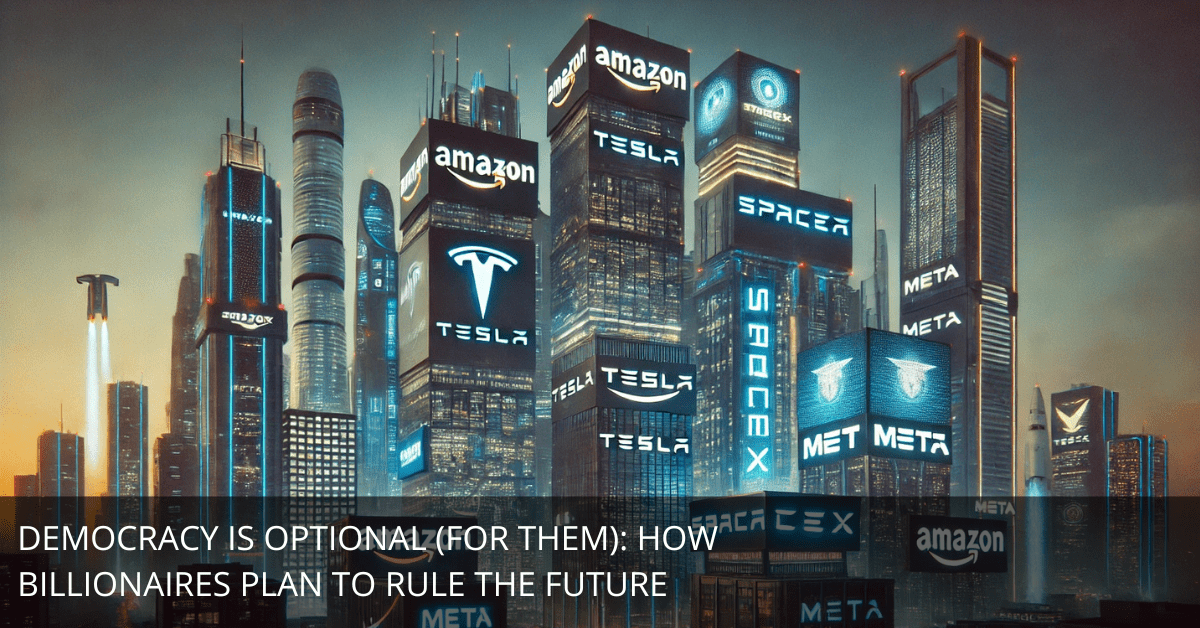
The future of America isn’t happening in Washington, D.C.
It’s happening in Silicon Valley boardrooms, private Telegram groups, and invite-only dinners where a handful of tech billionaires are making power plays that could reshape democracy itself.
This isn’t a conspiracy theory. This is straight from their own mouths, podcasts, blog posts, and financial investments.
They believe the American Empire is collapsing—and they don’t plan on going down with the ship. Instead, they’re plotting their exit: network states, self-governing corporate cities, and an extreme form of libertarianism where billionaires control the rules and everyone else is along for the ride (or kicked off the boat entirely).
If that sounds too dystopian to be real, stick with me. I’ll break down exactly what’s happening, who’s behind it, and what you can do about it—starting today.
The Takeover You Didn’t See Coming
This isn’t just about lower taxes and fewer regulations. That’s old news.
The real goal? A total reengineering of governance, power, and control.
Here’s what they’re doing:
1. Funding Political Puppets
Tech billionaires aren’t just donating to political campaigns—they’re buying influence to shape policy in their favor.
- Crypto firms alone account for over half of all corporate election spending.
- Their goal? To move financial oversight from the Securities and Exchange Commission (SEC) to the Commodity Futures Trading Commission (CFTC)—a much weaker regulatory body.
They’re not just lobbying for policy changes. They’re backing candidates who will gut government institutions that stand in their way.
2. Building Their Own Governments (Yes, Literally)
The next "superpower" won’t be a country. It will be a privately-run city, controlled by tech elites.
- Balaji Srinivasan calls it the "Network State"—a digital-first nation that doesn’t answer to any government.
- Curtis Yarvin takes it further: He believes nation-states should be replaced with thousands of corporate-owned mini-countries where democracy is optional (and likely discouraged).
And this isn’t just talk. Projects like Praxis, Pronomos, and California Forever are already laying the groundwork for these privatized, billionaire-run societies.
3. “Tech Zionism” and Land Grabs
These tech moguls aren’t waiting for permission.
They’re quietly buying land—block by block, city by city—with the long-term goal of creating their own self-governed territories.
- In Solano County, California, a group backed by Silicon Valley investors is attempting to build an entire new city, California Forever, outside government control.
- In Honduras, Africa, and Palau, Pronomos is funding “charter cities” where tech billionaires set the rules.
Balaji calls it Tech Zionism—seizing physical control, replacing local leadership, and enforcing their own brand of corporate governance.
4. Project 2025: The Playbook for Autocracy
If you think this is all just some startup fever dream, think again.
Project 2025 is a real, detailed plan backed by the Republican Party to completely overhaul the U.S. government under a second Trump administration.
Their step-by-step strategy includes:
- Consolidating executive power—giving the president unchecked authority.
- Purging government agencies—replacing career experts with political loyalists.
- Weakening the courts—making legal challenges nearly impossible.
- Crushing opposition media and academic institutions—limiting dissent.
This isn’t a fringe movement. It’s a coordinated power grab designed to weaken democracy and replace it with a billionaire-approved autocracy.
What You Can Do (Before It’s Too Late)
This isn’t the kind of thing you just “wait and see.” By the time the average person realizes what’s happening, the structures will already be in place.
But here’s the good news: You’re not powerless. There are concrete actions you can take right now to push back.
1. Track the Money and the Power
If you want to understand who’s really running the show, follow the money.
Here’s how to do it:
- Check OpenSecrets to see which politicians are taking money from tech billionaires and crypto lobbyists.
- Pay attention to land acquisitions—especially in places like California, Texas, and international charter cities.
- Stay informed on network state projects (Praxis, Pronomos, etc.) to see where they’re setting up shop.
You don’t have to be an investigative journalist. Just knowing what’s happening puts you ahead of 99% of people.
2. Hold Your Representatives Accountable
Politicians love to talk, but they only act when they feel pressure.
✅ Call your local and federal representatives. Ask them:
- Where do you stand on crypto regulation and private governance models?
- What’s your stance on Project 2025?
- Will you oppose billionaire-backed land grabs and corporate-run cities?
If they dodge the question, press harder. If they refuse to answer, find someone better to replace them.
3. Protect Democratic Institutions (Before They’re Gutted)
Autocrats don’t just take power—they convince people to stop caring.
Don’t let that happen.
- Support independent journalism (ProPublica, The Guardian, Democracy Now).
- Defend voting rights—because if they control elections, they control everything.
- Watch for attempts to weaken public institutions (schools, courts, labor laws).
The more distracted and divided people are, the easier it is for billionaires to take control.
4. Build Local Resistance to Land Grabs
The billionaires betting on Tech Zionism don’t expect pushback.
Here’s how you make their lives difficult:
- Attend local city planning meetings and oppose zoning changes that benefit tech investors.
- Support policies that prevent private ownership of public infrastructure.
- Expose who’s funding land purchases—they hate bad press.
If they want their own country, make them fight for every inch of land.
Final Thoughts
This isn’t about hating tech or being anti-progress.
It’s about who controls the future—and whether you get a say in it.
Right now, a small group of billionaires is pushing to reshape governance on their terms, creating a world where democracy is optional and power belongs to the highest bidder.
But they aren’t invincible.
They expect people to be passive. They count on you not paying attention. They assume no one will push back.
So prove them wrong.
Start now. Track their moves. Expose their agenda. Push back at every turn.
Because the future isn’t written yet—and you still have a pen in your hand.
FAQ: Answering Common Objections About How Tech Billionaires Are Reshaping America
“Tech billionaires are just successful entrepreneurs. They’re not trying to replace democracy.”
Success in business doesn’t mean they have good intentions for governance. Many of these billionaires openly discuss alternative government models that favor corporate control over democratic processes. Balaji Srinivasan’s "Network State" concept and Peter Thiel’s investments in privatized cities are proof that this isn’t speculation—it’s happening.
“If billionaires want to build private cities, why is that a bad thing? People can choose to live there or not.”
The problem isn’t people choosing to live in a private city. It’s that these corporate-run cities could gradually replace democratic governance, leaving fewer options for people who don’t want to live under corporate rule. Praxis, Pronomos, and Honduras' Próspera project are already testing this concept—and once established, they set a dangerous precedent for dismantling public governance in favor of profit-driven rule.
“Tech investments in politics are no different from what other industries do.”
Most industries lobby for policies that benefit them financially. But tech billionaires aren’t just trying to influence regulation—they’re pushing for an entirely new system of governance. Unlike banks or pharmaceutical companies, they are actively experimenting with privatized governments, crypto-driven economies, and the removal of democratic oversight over their projects. That’s a whole different level of influence.
“Crypto and blockchain technology can empower people, not just billionaires.”
Blockchain has the potential to decentralize power—but in reality, it’s being weaponized by a small group of elites who want to control financial systems. The rise of crypto-backed private cities, deregulated economies, and billionaire-led governance models shows that this technology is not democratizing power—it’s centralizing it in the hands of those who own the networks.
“Project 2025 is just a political strategy—it’s not a plan to take over the government.”
Project 2025 goes far beyond normal political planning. It’s a structured roadmap to centralize executive power, weaken the courts, and consolidate federal law enforcement under one authority. It’s designed to remove the checks and balances that prevent government overreach, making it far easier for tech elites to push their own agendas without opposition.
“This sounds like a conspiracy theory.”
Everything in this article is based on publicly available information, statements from tech billionaires themselves, and real-world projects already in progress. The “Network State” concept? Published in a book. Project 2025? On an official website. The funding of political campaigns by crypto billionaires? Documented by OpenSecrets. This isn’t speculation—it’s documented fact.
“If the government is inefficient, why shouldn’t tech billionaires create better alternatives?”
Government inefficiency doesn’t mean we should hand power to unaccountable billionaires. Democracy is flawed, but it allows for public input, legal protections, and transparency—things that don’t exist in corporate-controlled cities. Tech-driven governments prioritize efficiency for the benefit of their investors, not the public.
“Aren’t these private cities just a futuristic version of gated communities?”
Not at all. A gated community exists within a larger government system—it still follows national laws. A network state or private city, on the other hand, operates as its own government, setting its own laws, financial policies, and enforcement mechanisms. That’s an entirely different level of control.
“If people don’t like these billionaire-led projects, they don’t have to participate.”
That logic falls apart when these projects begin replacing public governance altogether. It’s not just about opting in—it’s about what happens when these models become the default and there’s no democratic alternative left.
“Aren’t these billionaires just visionaries trying to innovate?”
Innovation isn’t the issue—who controls it is. When a small group of ultra-rich individuals decides how society should function, with no public input or accountability, it’s not innovation—it’s authoritarianism in a new form.

